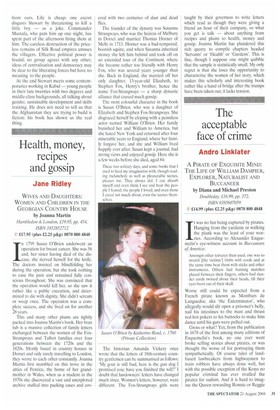Health, money, recipes and gossip
Jane Ridley
WIVES AND DAUGHTERS: WOMEN AND CHILDREN IN THE GEORGIAN COUNTRY HOUSE by Joanna Martin Hambledon & London, £19.95, pp. 454, ISBN 1852852712 (t..) £17.95 (plus £2.25 p&p) 0870 800 4848 In 1799 Susan O'Brien underwent an operation for breast cancer. She was 56 and, her sister having died of the disease, she nerved herself for the knife. The doctors insisted on blindfolding her during the operation, but she took nothing to ease the pain and remained fully conscious throughout. She was convinced that the operation would kill her, so she saw it rather like a public execution, and determined to die with dignity. She didn't scream or weep once. The operation was a complete success, and she lived on for another 28 years. This and many other plums are tightly packed into Joanna Martin's book. Her bran tub is a massive collection of family letters exchanged between the women of the FoxStrangways and Talbot families over four generations between the 1720s and the 1820s. Mostly based in country houses in Dorset and only rarely travelling to London, they wrote to each other constantly. Joanna Martin first stumbled on this trove in the attics of Penrice, the home of her grandmother in Wales, when as a student in the 1970s she discovered a vast and unexplored archive stuffed into packing cases and coy
ered with two centuries of dust and dead The founder of the dynasty was Susanna Strangways, who was the heiress of Melbury in Dorset and married Thomas Homer of Mells in 1713. Homer was a bad-tempered, boorish squire, and when Susanna inherited money she left him behind and took off on an extended tour of the Continent, where she became rather too friendly with Henry Fox, who was several years younger than she. Back in England, she married off her only daughter, 13-year-old Elizabeth, to Stephen Fox, Henry's brother, hence the name Fox-Strangways — a sharp dynastic alliance that caused much gossip.
The most colourful character in the book is Susan O'Brien, who was a daughter of Elizabeth and Stephen Fox-Strangways. She disgraced herself by eloping with a penniless actor named William O'Brien. Her family banished her and William to America, but she hated New York and returned after four miserable years to England, where her family forgave her, and she and William lived happily ever after, Susan kept a journal, had strong views and enjoyed gossip. Here she is a few weeks before she died, aged 84:
These two solitary days, and some books that I used to feed my imagination with, though reading melancholy as well as pleasurable scenes, pleases me. They always did. I can absorb myself and even think I see and hear the people I feared; the people I loved; and even those I cared not much about; even the scenes themselves.
The historian Amanda Vickery once wrote that the letters of 18th-century country gentlemen can be summarised as follows: 'My gout is still bad; here is the gun dog I promised you; have you finished the will?' I doubt that landowners' letters have changed much since. Women's letters, however, were different. The Fox-Strangways girls were taught by their governess to write letters which read as though they were giving a friend an hour of their company, so what you get is talk — about anything from recipes and plants to health, money and gossip. Joanna Martin has plundered this rich quarry to compile chapters headed 'Servants' or 'Health' or 'Gardens'. This is fine, though I suppose one might quibble that the sample is statistically small. My only regret is that she loses the opportunity to characterise the women of her story, which makes this scholarly and interesting book rather like a hand of bridge after the trumps have been taken out; it lacks tension.


























































 Previous page
Previous page